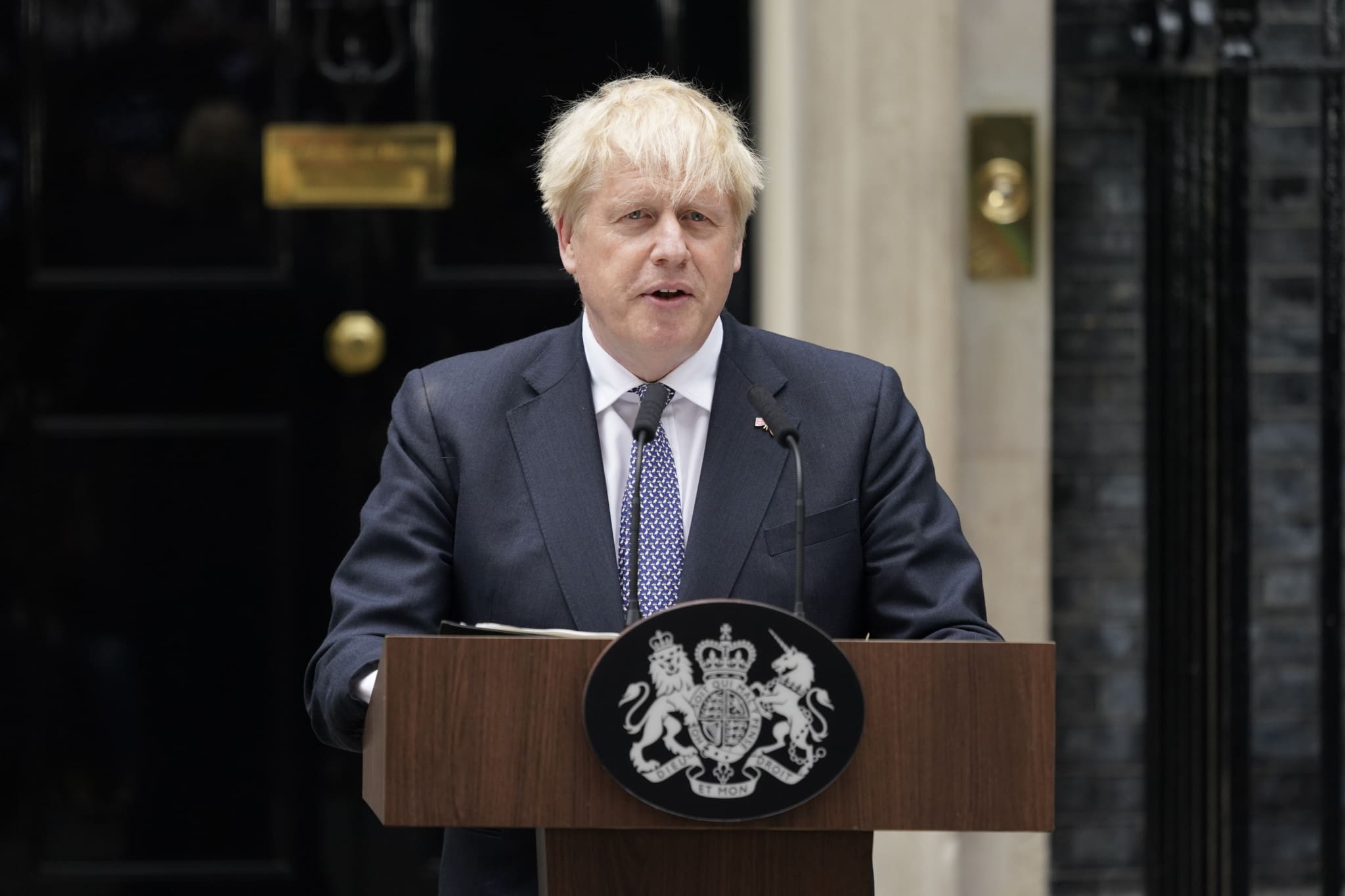“I’m sad to give up the best job in the world, but them’s the breaks,” U.K. Prime Minister Boris Johnson said from the steps of 10 Downing Street on Thursday afternoon as he, following days of speculation, announced he would be stepping down as the leader of the governing Conservative party.
In typical Boris-like fashion, the prime minister issued a statesman-like, composed statement during his address to the nation, in which he highlighted the perceived successes of his administration during his almost three years in office. Johnson spoke of his Brexit agreement with the European Union, the U.K.’s efficient coronavirus vaccine roll-out, and the unlocking of the country following the pandemic, which he said was the fastest in Europe; he also highlighted Britain’s unrelenting support for Ukraine in standing up to Russian aggression.
However, he said that “at Westminster the herd instinct is powerful,” and “when the herd moves, it moves.” He accepted his position was no longer tenable after no less than 59 government positions had been resigned over the course of a chaotic 48-hour period.
Despite initially expressing his desire to cling on to power following a defiant performance at Prime Minister’s Questions in the House of Commons on Wednesday afternoon, reports that evening that a number of his closest allies, including the serving Home Secretary Priti Patel and Chancellor Nadhim Zahawi — who Johnson had only appointed the day before — had urged him to walk appeared to be the final nail in the coffin.
Johnson told the nation on Thursday of his plan to remain in office during a transitional period during which a new leader of the Conservative party and de facto prime minister would be elected.
The list of candidates who may fancy their chances at succeeding Johnson is considerable, and a snap poll of Conservative party members shows the top job is up for grabs for a number of interested parties.
Top of the pile in the minds of Conservative party members, and the bookmakers’ favorite, is Ben Wallace, the U.K.’s current defense secretary who has overseen Britain’s military response to the Russian invasion of Ukraine.
Who is Ben Wallace?
A former soldier in the British Army, Wallace has served as a member of parliament since 2005. As a member of the Scots Guard, he served in Germany, Cyprus, Belize, and Northern Ireland from 1991 to 1998, and rose to the rank of captain.
Wallace, who has not yet announced his intention to stand for the Conservative party leadership, has been responsible for Britain’s international military partnerships including with NATO, as well as the country’s defense planning and nuclear deterrent.
He has previously served as a whip for the Conservative party and as a Northern Ireland minister.
Wallace supported the U.K. remaining within the European Union in the lead-up to the 2016 Brexit referendum.
Penny Mordaunt
Penny Mordaunt, the current minister for trade policy, is the grassroots most popular pro-Brexit candidate for high office, acquiring 12 percent of the vote in YouGov’s latest poll.
A staunch Brexiteer who was a prominent member of the Vote Leave campaign headed by Boris Johnson, Mordaunt has been the MP for Portsmouth North since 2010, a relatively safe Conservative seat since that time with a considerable current majority of 15,000.
She has served in successive Conservative governments under Johnson’s predecessors of Theresa May and David Cameron, previously holding prominent cabinet positions including secretary of state for international development and secretary of state for defence.
Mordaunt would become only the U.K.’s third female prime minister should she be victorious in any forthcoming leadership contest.
The best of the rest
Third favorite to move next door from his previous home at the Treasury is Rishi Sunak, who served Boris Johnson as his Chancellor until his resignation late on Tuesday.
Sunak reportedly clashed with Johnson over Britain’s economic policy in the wake of the coronavirus pandemic, and advocated the reining in of public spending and tax hikes to pay for the government’s expensive furlough scheme offered to workers during the country’s lockdowns.
Sunak is second-favorite among the bookmakers to succeed Johnson after Ben Wallace, at 5/2 and 7/2, respectively.
Despite voting leave in the Brexit referendum, a plus point in the minds of the Brexit-backing Conservative party membership, it remains to be seen whether the chancellor overseeing rapid levels of inflation and a cost-of-living crisis will be able to convince the membership that he is the man to take over.
Current Foreign Secretary Liz Truss is also considered to be a major contender for the role, and is polling strongly in fourth place with the membership. A regretful Remain voter, she has served at the Foreign Office since September last year.
According to YouGov polling, Truss would beat Penny Mordaunt, Rishi Sunak, and the man who lost to Johnson in the last leadership run-off, Jeremy Hunt, in a head-to-head, but she would prove unsuccessful against the bookies’ favorite Ben Wallace.
Two men to have already ruled themselves out of the running are Michael Gove, a perennial Conservative party leadership candidate, and Justice Secretary Dominic Raab, both highly rated by the membership amassing 7 percent of the poll apiece. Both men were prominent members of the Vote Leave campaign and have been critical during Brexit negotiations with the European Commission following Britain’s historic vote to leave the bloc back in 2016.
Latest polling shows the top-three criteria Conservative party members will be looking for in any forthcoming candidates include competence, the ability to unite the party, and someone who has the best chance of winning the next general election, currently to be no later than 2024.
In terms of government strategy, the intentions of the membership are a little more muddled with just 19 percent of respondents wanting Johnson’s successor to broadly continue the direction and policies of the former prime minister and just 10 percent wanting the party to deviate significantly from the government’s current strategy.






